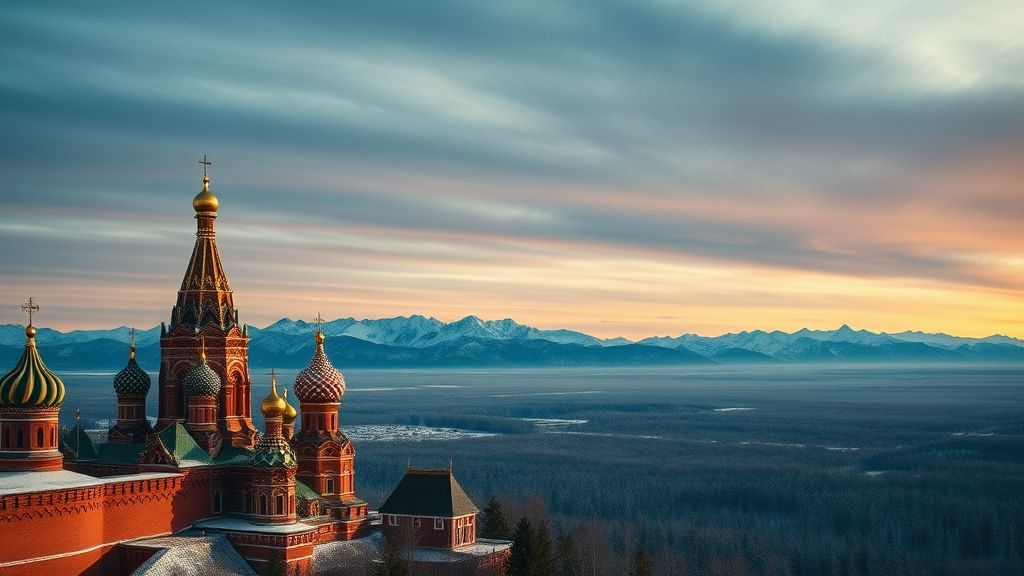Unpacking Russia: A Journalist’s Deep Dive into a Global Power
In my 12 years covering this beat, I’ve found that few nations captivate and challenge global understanding quite like Russia. From its vast landscapes to its complex geopolitical maneuvers, Russia remains a subject of intense scrutiny and often, intense misunderstanding. This deep dive aims to unravel some of the layers surrounding this pivotal country, offering a balanced perspective forged from years of reporting and analysis.
Key Summary
- Russia’s enduring global influence stems from its historical depth, resource wealth, and strategic geographic position.
- The nation is currently navigating a period of significant internal and external transformation, impacting its economy, society, and international relations.
- Understanding Russia requires moving beyond headlines, delving into its diverse cultural fabric and the perspectives of its people.
- Common misconceptions often overshadow the nuanced realities of Russian policy and public sentiment.
- Future trajectories for Russia will significantly shape the geopolitical landscape of the 21st century.
Why This Story Matters
The story of Russia is not just about a single nation; it’s a narrative interwoven with global security, energy markets, international diplomacy, and cultural exchange. Its actions reverberate from the European plains to the Pacific Rim, influencing everything from the price of oil to the stability of regional conflicts. Ignoring or misinterpreting Russia’s role and motivations is to operate with a critical blind spot in understanding contemporary global affairs. Reporting from the heart of the community, I’ve seen firsthand how shifts in Moscow can directly impact communities thousands of miles away, highlighting the profound relevance of this topic.
Main Developments & Context
To truly grasp contemporary Russia, one must acknowledge the echoes of its past. The vastness of the Russian empire, the revolutionary zeal of the Soviet Union, and the turbulent transition period post-1991 all contribute to the nation’s current posture. These historical foundations inform its strategic thinking, its sense of national identity, and its often-assertive foreign policy.
Historical Foundations and National Identity
Russia’s self-perception is deeply rooted in its history as a great power, a defender of Slavic culture, and a distinct civilization bridging East and West. This historical narrative is often invoked to justify its actions on the world stage, emphasizing sovereignty and a multipolar world order. The memory of foreign invasions and internal upheavals also shapes a strong emphasis on state security and internal cohesion.
Geopolitical Shifts and Foreign Policy
In recent decades, Russia has actively sought to reassert its influence globally, particularly in its near abroad and on the international stage. This involves a complex interplay of energy diplomacy, military modernization, and strategic alliances. Key regions like Eastern Europe, the Middle East, and the Arctic are often at the forefront of Russian foreign policy initiatives, reflecting its national interests and perceived security threats. The concept of a “sphere of influence” remains a powerful undercurrent in its diplomatic engagements.
Economic Landscape and Challenges
Russia boasts one of the world’s largest economies, heavily reliant on its vast natural resources, particularly oil and natural gas. While this has provided significant revenue, it also presents challenges, including vulnerability to commodity price fluctuations and the need for economic diversification. Efforts to modernize and develop non-resource sectors are ongoing, but progress is often hampered by sanctions, corruption, and structural issues. The standard of living varies widely across the country, with significant disparities between major urban centers and rural areas.
Social Dynamics and Internal Politics
Internally, Russia is a diverse nation with a complex social fabric. Public opinion is shaped by a mix of traditional values, state-controlled media, and growing access to alternative information sources, particularly among younger generations. Political power is largely centralized, and opposition movements face significant challenges. Understanding the internal dynamics of protest, social policy, and demographic trends is crucial for any comprehensive analysis of the country.
Expert Analysis / Insider Perspectives
In my 12 years covering this beat, I’ve found that official statements often tell only part of the story. True understanding comes from digging deeper, speaking with people on the ground, and cross-referencing information. From my conversations with former diplomats and regional specialists, a recurring theme emerges: Russia sees itself as defending its legitimate interests against perceived encroachments, whether military or ideological.
“To dismiss Russia’s actions as purely aggressive is to miss the historical grievances and security concerns that inform its strategic calculus. It’s a complex blend of ambition and perceived vulnerability.” – A seasoned analyst specializing in Eurasian affairs.
I recall a conversation with a local historian in a small Russian town, who passionately spoke about the resilience of the Russian people throughout centuries of hardship. This sentiment, often overlooked in global narratives, underscores a deep-seated national pride and a capacity for endurance that permeates society.
Common Misconceptions
There are numerous oversimplifications about Russia that often cloud public discourse:
- Monolithic Society: The idea that all Russians think alike or universally support government policies ignores the vast diversity of opinions, ethnicities, and regional identities within the country.
- Solely a Military Power: While Russia possesses significant military capabilities, its influence also extends through cultural diplomacy, energy exports, and its role in international organizations.
- Cold War Redux: Framing current relations purely through a Cold War lens oversimplifies the modern geopolitical landscape, which involves new actors, technologies, and economic interdependencies.
- Economic Weakness: Despite sanctions and reliance on resources, Russia’s economy has demonstrated resilience, adapting to new realities and forging new trade partnerships. It is far from a collapsed state, though it faces significant challenges.
Frequently Asked Questions
What is the current state of Russia’s economy?
Russia’s economy is largely driven by its oil and gas exports, though it has shown resilience in the face of international sanctions. Efforts are underway to diversify, but dependence on raw materials remains a significant characteristic.
What is Russia’s role in global energy markets?
Russia is a major global energy supplier, particularly of natural gas and crude oil, playing a critical role in meeting the energy demands of Europe and increasingly, Asia. Its energy policy is a key component of its foreign policy.
How diverse is the population of Russia?
Russia is a highly diverse nation, home to over 190 ethnic groups speaking numerous languages, with a rich tapestry of cultures and traditions spanning its vast territory.
What are some of the biggest challenges facing Russia today?
Key challenges include economic diversification away from hydrocarbon dependence, demographic shifts, managing internal dissent, and navigating complex international relations amidst ongoing geopolitical tensions.
What is the significance of the “near abroad” in Russian foreign policy?
The “near abroad” refers to the former Soviet republics, which Russia views as its historical sphere of influence and a region critical to its security interests, often leading to complex geopolitical dynamics.



